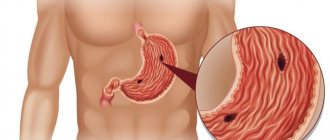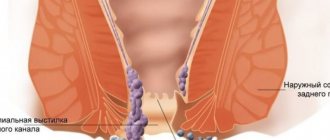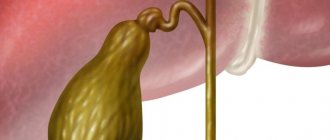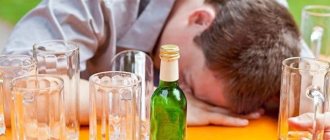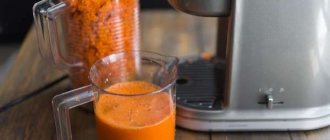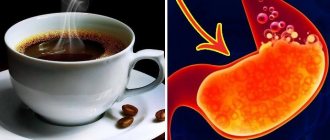What are the true causes of gastritis?
In order to conclude whether it is possible to drink beer with gastritis, you need to understand what causes the disease. There is no clear answer to the question of why this happens. Statistics state the fact that nutritional disorders are not always the decisive factor in the development of the disease. Gastritis may appear for the following reasons:
- The bacterium Helicobacter is present in the stomach. It irritates the mucous membrane and greatly increases the acidity in the stomach, which causes damage to the epithelium.
- During reflux, bile is thrown into the stomach cavity, which begins to digest the cells of not only the mucous membrane, but also the deeper layers.
- Due to deficiencies in the functioning of the immune system, antibodies are produced that destroy the cells of the stomach glands, followed by atrophy of the mucous membrane.
- Toxic and caustic substances and heavy metals enter the body.
- Medicines are used that destroy the structure of stomach tissue.
- Work activity is associated with psycho-emotional stress.
- A thoughtless passion for fasting and unbalanced diets leads the body to exhaustion and disruption of the digestive system.
- Severe dietary disturbances occur: fast food products, fatty and fried foods, smoked foods, spicy and salty foods are consumed. The routine is disrupted; there is an excessive amount of food in a portion, which leads to overeating.
When determining whether beer can be used for gastritis, if the drink does not contain ethyl alcohol, you need to pay attention that non-alcoholic beer is also a fermentation product, which causes belching and stagnant processes in the digestive system. As a result, the size of the stomach increases, heartburn occurs after eating, nausea, and sometimes vomiting.
Any alcohol is a liquid with an aggressive environment. Alcohol-containing drinks, corroding the walls of the stomach, can lead to the development of cancer, ulcers, and acute gastritis. Before you treat yourself to your favorite product, you should remember that alcohol has some analgesic effect. Therefore, there may be no pain when drinking beer, but this does not mean that destructive processes in the stomach do not occur.
It is believed that unfiltered beer is acceptable for gastritis, as it is more beneficial. The drink not only has an anesthetic property, but also serves as an antiseptic, suppressing the activity of pathogenic microflora.
Liver treatment for alcoholism
In the first stages, the disease is completely reversible. If you give up alcohol, fatty liver disease will go away on its own. The patient must normalize his diet, giving up fat completely, and take medications that normalize metabolism. If an alcoholic develops cirrhosis or hepatitis, then drug treatment will be required. Absolutely all patients suffering from alcoholism must undergo detoxification therapy. It consists of the following stages:
- ml of glucose solution is administered intravenously along with Essentiale or lipoic acid solution.
- Pyridoxine solution is administered intravenously.
- Patients are given Thiamine and Piracetam in the form of a solution.
- Hemodez 200 ml is administered intravenously.
The course of detoxification therapy lasts 4-5 days. To accelerate liver recovery, the patient is prescribed essential phospholipids. If the patient develops fibrosis while abstaining from alcohol, he is given ursodeoxycholic acid and other hepatoprotectors. They promote the outflow of bile and improve metabolism. At the end stage of fibrosis, accompanied by necrosis and proliferation of connective tissue, patients require liver transplantation.
Medications
Alcoholic liver damage cannot be eliminated with medications at home. Under the influence of alcohol, significant changes in metabolism occur, so detoxification therapy should be carried out by a doctor. After discharge from the hospital, the patient may be prescribed the following groups of drugs to normalize the functioning of the exocrine glands and reduce cravings for alcohol:
Ademetionine is an indispensable drug in the treatment of cholestasis and alcohol dependence. It has antioxidant, hepatoprotective, neuroprotective and antidepressant effects on the body. The drug normalizes the activity of hepatocytes, promotes the transfer of bile to the biliary system. In the hospital, the drug is given in the form of a solution of 0.8 g/day. At home, the patient should take 2-4 tablets/day. In many patients, long-term use of Ademethionine causes pain in the epigastric region, because it increases stomach acidity.
Glycyrrhizic acid is given to alcoholics along with phospholipids. It restores the biological integrity of hepatocyte membranes and prevents the loss of enzymes. In rare cases, it causes allergies. In cirrhosis, glycyrrhizic acid prevents the formation of hepatic connective tissue. You can buy it in the form of a solution or tablets. Phosphogliv and Essentialgliv contain a large dose of this substance. Typically, for mild lesions of the gland, alcoholics are prescribed 2-3 tablets of glycyrrhizic acid 3-4 times a day.
Essentiale helps with hepatitis, cirrhosis and necrosis of liver cells. In a hospital, alcoholics are given the medicine intravenously in 10 ml doses. The standard course is 17 injections. At the same time, the patient should take 2 capsules of the drug 3 times a day. After discharge, the dosage of the medication is changed. For 3 months, an alcoholic should take 3 tablets 4 times a day. Rarely, in cases of overdose, patients experience diarrhea.
Some patients are admitted to the hospital with severe acute alcoholic hepatitis. Metypred is prescribed to alleviate the course of the disease. In this case, patients are first checked for the absence of infections and gastrointestinal bleeding. The corticosteroid is taken 1 or 2 times a day. The total daily dose should not exceed 32 mg. The medicine relieves inflammation and eliminates allergic reactions. Patients who take Metipred for a long time develop arrhythmia and hypotension. In alcoholics, the drug causes frequent mood swings and disorientation.
Special diet
The liver of a drinker is exposed to highly toxic chemicals. To normalize its functioning, doctors recommend not only giving up alcohol, but also reconsidering your nutrition plan. When treating chronic or toxic hepatitis, doctors prescribe patients a high-protein diet. Quitting alcohol is mandatory during therapy. If an alcoholic continues to drink vodka, beer or other high-proof drinks, then correcting the diet will not help. For alcoholic fibrosis, hepatitis, and steatosis, patients are allowed to eat the following foods:
- veal, rabbit and other lean meats;
- cottage cheese, kefir, low-fat sour cream;
- boiled potatoes, broccoli, zucchini;
- raw cucumbers, carrots, cabbage, tomatoes;
- dried fruits.
What doctors say about beer
The strength of this liquid is lower than that of grape wine and vodka, so beer causes less harm to the body than other drinks. But doctors do not have a clear opinion on the use of this alcoholic drink.
Research has shown that the product contains proteins, polyphenols, a large list of vitamins and minerals, and antioxidants. All these compounds contribute to the prevention of cardiovascular diseases, senile dementia, cancer and atherosclerosis.
The presence of beneficial substances makes beer consumption an important factor for strengthening the body's defenses; tissue regeneration processes are stimulated, the rate of bacterial reproduction is reduced. For this reason, some patients believe that it is acceptable to drink the drink during pathological changes in the gastrointestinal tract.
Most doctors do not allow the presence of this product in the diet of people with stomach diseases for several reasons:
- Even a non-alcoholic product contains a small amount of alcohol, which can aggravate the destructive processes in the epithelial layer of the stomach.
- Beer is a carbonated drink; when it enters the body, carbonic acid increases the acidity of the stomach.
- The drink contains ballast substances and stabilizers, which cause stable foaming and enhance the taste. These additives can cause additional irritation of the lining of the digestive organ, initiate inflammatory processes and cause discomfort.
Consequences of long-term drinking
Frequent consumption of alcoholic beverages causes three main diseases that affect the liver:
- cirrhosis;
- hepatitis;
- dystrophy.
Fatty degeneration is the first to make itself felt. It is expressed in a disgusting feeling, heaviness in the right side and sharp pain when pressing or tapping on the liver. Alcoholic hepatitis is the appearance and development of inflammatory processes in the liver due to the systematic intake of ethyl alcohol in large doses. The weaker the body, the greater the dose and frequency of drinking, the higher the degree and speed of organ damage.
As the disease progresses, it develops into cirrhosis. It affects about 40% of chronic alcoholics with experience of 7-8 years, and about half of people who have been drinking for ~ 10 years. The disease is characterized by necrosis of liver tissue, an increase in its volume, high pain, and the appearance of a yellow tint to the skin. Due to the manifestations hidden from consciousness and the well-known attitude of drinkers to health, cirrhosis is often detected in the final stages, when modern medicine can offer little to save the patient’s life. And even after stopping alcohol consumption, the process of organ regeneration is practically impossible.
Alcoholic form of the disease
Regular consumption of beer is addictive. This is explained by the fact that it is not considered a dangerous alcoholic product. It does not cause severe intoxication; a beer alcoholic does not immediately develop behavioral deviations. In addition, the liquid entering the stomach has an analgesic and anti-inflammatory effect.
A patient diagnosed with gastritis experiences relief when drinking this drink, as pain symptoms decrease and relaxation occurs. There is a need for daily consumption of beer, because after this comes peace. Dulled reactions do not allow one to adequately assess the condition; the patient begins to convince himself that he has no health problems. Beer addiction can prevent you from noticing the transition of the disease to a more severe pathology.
When does a doctor allow alcohol intake and what drinks are allowed?
If there is a local defect in the gastric mucosa, you can drink:
Previously, lovers of traditional methods of treatment practiced drinking strong alcoholic beverages. Its use cauterizes ulcers, as traditional healers believe. This interpretation is fundamentally incorrect and absolutely unscientific. Vodka causes less harm for stomach ulcers than beer or martini. It is allowed to drink vodka in very small quantities after a heavy lunch or dinner. The drink must be of high quality and not expired. However, the best choice for health-conscious people is to abstain from drinking alcohol completely. In this way, you will not only avoid aggravating your stomach ulcer, but will also protect yourself from many other pathologies.
Features of an unfiltered drink
During production, beer undergoes several degrees of purification, this changes color and makes its shelf life longer. The unfiltered product is not stored for long; experts call it “live.” The fact is that it contains a yeast culture, which makes the drink opaque. Living microorganisms increase the nutritional value of a gastronomic product and impart a characteristic taste and smell.
This type of beer is not pasteurized, so it retains a lot of substances beneficial to the body. In addition, the amount of vitamins and amino acids in the unfiltered drink is greater, and its calorie content is lower than in other varieties of this product. The short shelf life implies the absence of preservatives in its composition. Manufacturers claim that a small amount of unfiltered drink has a positive effect on the digestion process. Its active substances are able to remove toxins (for example, heavy metals), reduce pain and tone the body.
Results
Beer can only be drunk by those with a disease characterized by low acidity. You can drink in small quantities (1 glass per day will be sufficient). Drink it with extreme caution and only during remission if you have gastritis. It is of great importance to drink the drink not on an empty stomach, since an empty stomach has an increased susceptibility to alcohol. Following the advice of doctors, it is better not to drink beer at all if you have stomach problems, so as not to accelerate the development of the disease or worsen your health.
Hangover protection
To avoid the question of what to drink for a hangover in the morning, after a feast, before going to bed, you need to drink 1 tablet of Aspirin, 2 tablets of No-shpa and Activated Charcoal (per 10 kg of weight - 1 tablet). The best hangover remedies are tablets and sorbent products. They help remove alcohol and toxins from the body.
A hangover occurs due to the fact that the body could not cope with the amount of alcoholic beverages poured into it. Today, Zorex morning is popular, effervescent tablets whose instructions for use are described on the packaging. The medicine should be used for headaches resulting from a hangover, all kinds of pain (muscle pain, dental pain, headaches), high temperature during infectious diseases.
Alcohol is very harmful to the body. It has a negative effect on almost all organs, so it is not recommended to abuse alcohol. But if it is still not possible to stop using them, moderation should be observed.
